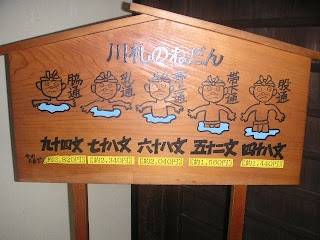He would have to buy tickets called KAWAFUDA.
If he wanted a ride on KAWAGOE NINSOKU's shoulders.
Buy one KAWAFUDA
If a person wanted he ride on a RENDAI.
Buy six KAWAFUDAs
If two persons wanted they ride on a RENDAI.
Buy eight KAWAFUDAs
KAWAFUDA's price changed by water level of the river.
Under the crotch---about US$ 18 per a KAWAFUDA
Under the waist----about US$ 20 per a KAWAFUDA
Over the waist-----about US$ 26 per a KAWAFUDA
the nipple---------about US$ 29 per a KAWAFUDA
the armpit---------about US$ 36 per a KAWAFUDA
 |
| KAWAFUDA'S price table |
| KAWAGOE festival1 |
| KAWAGOE festival2 |
| KAWAGOE festival3 |
| In the room3 |
| TANABATA (offer a prayer for revival from East Japan earthquake) |
Hey there, Jun! I'm Isaac!
ReplyDeleteI really appreciate your blog. It's tells of many different facets of Japanese culture that I would never be aware of otherwise. However, I have spotted a couple errors in your post.
"A person cross the river must pay a charge for carrying when he(or she) use KAWAGOE NINSOKU."
In this sentence, instead of just the word 'cross', you should use 'crossing'. Also, instead of 'for carrying', you should write 'to be carried'. In addition, instead of 'use', you should write 'uses'. The sentence should end up like this:
"A person crossing the river must pay a charge to be carried when he (or she) uses KAWAGOE NINSOKU."
This sentence:
"He (or she) have to buy tickets called KAWAFUDA."
Should look like this:
"He (or she) would have to buy tickets called KAWAFUDA."
The following sentence:
"In case of ride on a KAWAGOE NINSOKU's shoulders."
Doesn't really make any sense at all; I think what you are trying to write is:
"If he (or she) wanted a ride on KAWAGOE NINSOKU's shoulders..."
In addition, you do not need to write '(or she)' every time after you say 'he'. It is polite to write it the first time, but otherwise it is unnecessary and distracts the reader. You're not actually doing anything wrong per se, but it just gets a bit annoying after a while.
Otherwise, nice post. I really appreciate you writing for us - and I really appreciate that you want to learn English as well (that is very brave of you). I'm currently starting my studies in Japanese (which consists of learning the characters that make up hiragana), so perhaps when I learn more I can write to you and you can give me similar criticism like that which I gave you. If you're interested, comment back or e-mail me (dogsgofetch@gmail.com); we can help each other in our studies.
Please continue posting! You live in a beautiful country with a rich history, and I'd love to hear everything you have to say about it!
Oh, in addition, below the word at the top of your site (otherwise known as the tagline), you wrote:
ReplyDelete"Introduce about interesting goods and information from Japan. Get together somebody love Japan. Please check this site!"
I'm not quite sure what you mean by "Get together somebody love Japan", but I would rewrite the whole thing as:
"Introduction to the interesting goods and information about Japan. This is a place for people who love Japan! Please check out this site!"
Furthermore, I must say that this isn't an excellent tagline. I would rewrite it as something more catchy, such as:
"Japan has tons of goods and information,
come check out my blog and your brain will have a transformation!"
Admittedly, that isn't the best tagline either, but it rhymes and it get the point across. You are free to use it if you want, but if you don't want to use it, that is fine as well.
Hi! Isaac.
ReplyDeleteThank you for your comment.
I'm glad you visited my blog.
And Thank you for checking my English.
I changed my blog's sentence based on your comment.
If you have any questions about Japanese, Please tell me.